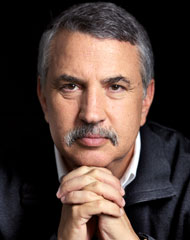The stage appears to be set for what could be the future of higher education. Massive Open Online Courses (MOOCs) are one of the hot topics for universities around the country, with hundreds of courses being offered worldwide at no cost to users. Some have said that this move towards online higher education is a revolution. Is this true…or is it deja vu?
Thomas L. Friedman, an op-ed columnist for the New York Times, wrote an essay on March 5, 2013 titled “The Professors’ Big Stage”. In it, Friedman expressed his belief that MOOCS and online learning will have a huge impact not only in the United States, but also globally. He opens by telling a convincing story about his friend Michael Sandel, a Harvard professor, who has gained attention worldwide as a result of his new online “Justice” course. Having become a celebrity in both Korea and China, Friedman states that he has received popularity “usually reserved for Hollywood movie stars and N.B.A. players.” Friedman uses this illustration to convey the magnitude of the situation. He believes that “the MOOCs revolution, which will go through many growing pains, is here and is real.” Using information that he gained from a recent conference organized by MIT and Harvard, Friedman goes on to discuss the changes in education. He describes how there is beginning to be a shift where there is “less interest in how you acquired the competency … and more demand to prove that you mastered the competency.” Friedman believes that this trend will create the necessity for colleges to not only offer online courses by themselves, but also to make them an integral part of regular classroom learning. He thinks that regular note-taking learning environments will increasingly be removed in favor of online courses or supplements, and that soon classrooms will only be a place where “knowledge can be honed through lab experiments and discussions with the professor.” In order to keep jobs, professors will also have to improve their teaching skills and ability to talk with students, or fear that they will be replaced by better instructors online. While Friedman does acknowledge that there is “still” value in traditional classrooms, he warns that universities will need to blend technology into their education if they want to thrive.
A little over a month after Friedman’s piece, an article by Susan Matt and Luke Fernandez on April 23, 2013 for The Chronicle of Higher Education challenged his perspective. Titled “Before MOOCs, ‘Colleges of the Air'”, their article challenges much of the hype surrounding online learning by noting that the idea is not nearly as revolutionary as what Friedman and other supporters think. The authors, both from Weber State, write about how in the 1920’s and 1930’s, “massive open ‘on air’ courses” swept the country. With new technology readily available, thousands embraced the idea that college courses could be taught over the radio. Throughout the article, Matt and Fernandez make striking comparisons to the modern day. Just like MOOCs, many of the leading universities such as Harvard, Columbia, Kansas State, and Ohio State were offering ‘open air’ courses. To sign up for a class, Matt and Fernandez state that “students registered by mail and received a syllabus by return mail. Some then mailed in assignments to the faculty.” Advocates praised these courses as creative and potentially successful ways to “reduce isolation” and “mitigate class differences.” However, Matt and Fernandez suggest that radio courses eventually succumbed to the same problems that might affect the MOOCs today. Attrition and the temptation of other forms of entertainment plagued the ‘open air’ courses. The learning also became passive, with a tendency to absorb information but not apply it, and social interaction was minimized. Another problem, according to the article, was that once students finished the course, “it wasn’t clear what that meant.” Just like MOOCs today, some universities in the 1920’s and 1930’s offered certificates, but very few offered credits, making the usefulness of the course hard to understand. While the article does admit that MOOCs are different than radio courses and offer the potential for more interaction, Matt and Fernandez are still skeptical. They write, “While MOOCs expose students to information, that is not the most fundamental dimension of learning. Perhaps most central to an education are the habits of mental discipline and the motivation it instills.”
It is undeniable that MOOCs are becoming more popular and widespread, but questions about their effectiveness are also intensifying. While many people would agree that incorporating technology into a classroom setting could be useful, the success of having online courses stand alone remains to be seen. The prospect of cheap yet high quality learning is indeed one that is worth getting excited about, but perhaps should first be met with a healthy dose of skepticism…or history. Learning from previous examples, such as the radio ‘open air’ courses, provide an important way to avoid making similar mistakes in the future. Although viewed as a failure, acknowledging their existence does show at least that people have long yearned for massive open education. Perhaps now, that reality is not far away.
This post is part of a series on “Making History Online” that involves an examination of open online learning. Students and faculty at the House Divided Project at Dickinson College are collaborating this summer on a new open, online course called, “Understanding Lincoln,” taught by Prof. Matthew Pinsker and covering ways to teach Abraham Lincoln’s legacy using close readings of his most important writings. This new type of online course represents a unique partnership between Dickinson College and the Gilder Lehrman Institute of American History. The course is available for both graduate credit and free participation. Registration for the course closes on Friday, July 19, 2013. For more information, go to https://www.gilderlehrman.org/programs-exhibitions/understanding-lincoln-graduate-course.









Related Articles
No user responded in this post
Leave A Reply
Please Note: Comment moderation maybe active so there is no need to resubmit your comments